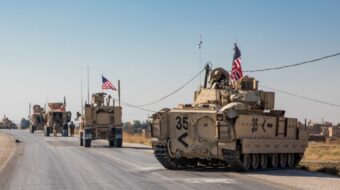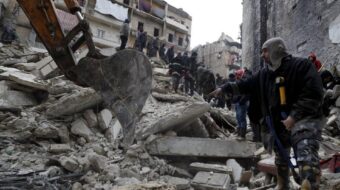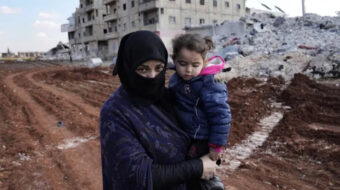
Kofi Annan, the former UN secretary-general, is warning against further militarization of the Syrian conflict. And he is urging Syrian opposition forces to find a political solution that includes meeting with government representatives.
Annan has been appointed joint U.N.-Arab League envoy to Syria. He is scheduled to travel to Damascus on Friday.
He told a Cairo news conference this week that his top priority is to end the violence and deliver badly needed humanitarian aid.
“I hope that no one is thinking very seriously of using force in this situation,” Annan said. “I believe any further militarization would make the situation worse.”
At the news conference, which followed talks with Arab League chief Nabil Elaraby, Annan said he would be making “realistic” proposals to resolve the conflict. He said his mission was to start a “political process” in Syria to resolve the conflict there, and his only priority was the welfare of the Syrian people. “They are a brave, ancient people and they deserve better,” he said.
This is a welcome development, one that should be supported by our government and others.
But any political solution must involve not just self-appointed leaders but all sectors of Syria’s people, including the country’s many minorities, its workers, and its left, progressive and social justice forces. It also has to include the many Syrians who, for a variety of reasons including not-unfounded fear of an Islamist or al-Qaeda takeover, continue to support the Assad regime.
It is only through the involvement of all sections of the Syrian people that meaningful peace, democracy, human rights and economic and social justice can be brought into being in Syria. That will undoubtedly lead at some point to the end of the Assad regime, a remnant of the one-person one-party dictatorships that Britain and France, and later the U.S., found it useful to set up and bolster in the Middle East. But to make the ouster of Assad, by any means necessary, the sole initial demand serves only to ramp up the bloodshed on all sides.
On a related note, it is noteworthy that President Obama on Tuesday spoke out strongly against today’s warhawks, with regard to Iran but also Syria.
“When I see the casualness with which some of these folks talk about war, I’m reminded of the costs involved in war,” he told reporters at a White House news conference. “This is not a game. And there’s nothing casual about it.”
“If some of these folks think that it’s time to launch a war, they should say so, and they should explain to the American people exactly why they would do that and what the consequences would be,” the president said.
With regard to Syria, Obama said, “For us to take military action unilaterally, as some have suggested, or to think that somehow there is some simple solution, I think is a mistake.”
In the past, he said, in an obvious reference to the Iraq war, “when we haven’t thought it through and it gets wrapped up in politics – we make mistakes. And typically it’s not the folks who are popping off who pay the price.”
Photo: AP












Comments